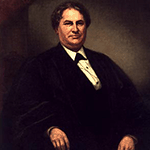
Samuel Freeman Miller (1862-1890)
Samuel Miller lived from 1816 to 1890.
Early Life
Miller was born on April 5, 1816 in Richmond, Kentucky. Miller was trained as a physician, earning his medical degree from Transylvania University in Lexington. While practicing medicine, Miller studied law on his own, ultimately passing the Kentucky bar exam in 1847. Before moving to Iowa, Miller, an abolitionist, freed his own slaves, so that he would not have to submit to Kentucky’s strong position on slavery. Although Miller never sought political office, he was very active in the creation of Iowa’s Republican Party.
Appointment to the Supreme Court
On July 16, 1862, shortly after the beginning of the Civil War, President Abraham Lincoln nominated Miller to the Supreme Court. Miller’s reputation was so impressive that the Senate confirmed his appointment half an hour after receiving the nomination.
Miller’s political positions strongly favored those of President Lincoln during the Civil War. In example, he voted to uphold the suspension of habeas corpus and trials by military commission during wartime. However, he later joined the majority opinions in United States v. Cruikshank and the Civil Rights Cases, which held that the Fourteenth Amendment did not give the government the power to prevent private discrimination against African Americans. In Ex Parte Yarbrough, Miller changed his view, holding that the United States government had broad power to prevent the Ku Klux Klan and other private groups from violently interfering with African Americans’ right to vote.
After the 1876 presidential election between Rutherford Hayes and Samuel Tilden, Miller served on the electoral commission that awarded Hayes, the Republican, the disputed electoral votes.
Death
Miller died on October 13, 1890 in Washington D.C. while still on the bench. He is buried at Oakland Cemetery in Keokuk, Iowa.
Notable Cases
Slaughterhouse Cases (1873)
Murdock v. Memphis (1874)
United States v. Kagama (1886)
In re Burrus (1890)








